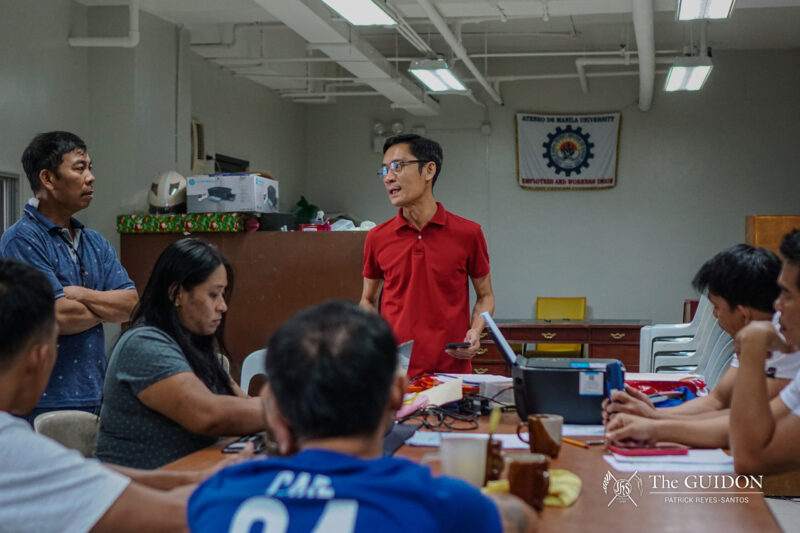AFTER BEING found guilty on charges of “gross negligence” during the 2011 Freshmen and Special Elections, Commission on Elections (Comelec) Chief Commissioner Jon Andre Vergara is the first student official to be impeached in three years.
The Student Judicial Court (SJC) found him guilty in a 5-1 decision last September 1, replacing him with second-in-command Commissioner Margaux Tan.
The ex-chief was convicted for “failure to facilitate the logistical need of the election leading to the delay [sic] opening of voting centers by 9:30 AM,” as he had prioritized his Department of Student Welfare and Services shift over supervising the polls.
The trial
The August 26 trial followed SJC’s general impeachment procedures, with each side having ten minutes to present their case, followed by a one-hour rebuttal and a five-minute closing statement.
The prosecution opened with a proxy reading the statement of Comelec Commissioner for Promotions Angeli Villaraza. Villaraza’s statement cited Vergara’s tardiness, lack of initiative, and the inability to address the concerns of the commission as grounds for impeachment.
Vergara replied that the planning for the freshmen elections was held relatively early in July. He said that tasks were properly divided among the logistics department and were delegated to an associate commissioner before the polling. Responding to Villaraza’s “lack of presence” allegation, Vergara cited commitments to his thesis as his reason.
Following the SJC’s “Rules of Court,” magistrates deliberated for six days before releasing the verdict last September 1.
As the supervisory body over the Comelec, SJC prosecutors Kyle Russell O. Dy Tan, Abigail J. Uy, and Sammy O. Chua filed the complaint.
Impeachment process
“The whole process of impeachment [starts with] a complaint [being] filed,” says SJC Chief Magistrate Gerald Chua in a mix of English and Filipino.
“Anybody in the Loyola School community [can file complaints], except for magistrate[s] or the chief magistrate,” he adds. In such exceptional cases, the magistrate who filed the complaint must inhibit himself from the case to avoid a conflict of interest.
This is in keeping with a student’s right to “initiate the recall and impeachment of an appointed and elected Sanggunian official,” as mentioned in Article II of the 2005 undergraduate students’ Constitution. The Constitution is included in all copies of the Loyola Schools student handbook.
Magistrates will then consider the petition via majority vote. If accepted, Chua says a notice would be sent “to [the] Top Four of Sanggu, the petitioner, the respondent and other parties that might be included or might have a say in the said topic.” The actual hearing then follows.
In Vergara’s case, a notice was also sent to the Office of Student Activities, which oversees student groups such as the Comelec.
If the petition is rejected, however, a rationale would be sent to the petitioner, explaining that the case is found to lack due merit, is moot, or is outside SJC’s jurisdiction.
Chua explains that the overall basis for impeachment is gross neglect of duty, which branches off to the abuse of power and the failure to perform duties and responsibilities. “Not everything can be stated in the constitution… It can only specify the duties a specific officer must have,” he says.
Vergara was found guilty of the second of two complaints: for failing to “supervise and administer the logistics of the actual elections, i.e. setting up voting centers,” a duty of the Comelec commissioner as listed in Section 4, Title III of the Comelec Code of Internal Procedures.
He was, however, acquitted of the first complaint, which was the “failure to prepare and set-up materials for voting centers.” During the elections, the poll body experienced technical difficulties caused by the lack of extension cords and the compatibility issues of the laptops provided by Neo Manufacturing and Services, Inc (NEO).
The SJC ruled that this was the collective burden of the commissioners’ board, which crafted the memorandum of agreement with NEO for the automation of the elections.
Chua says that the impeachment hearing’s purpose is to remove any arbitrary interpretation of charges. “It’s not just: ‘I think it’s gross neglect [of duty], that’s it.’ We have to hear the side of the respondent to say that that is really what happened.”
Other grounds for impeachment include the ineligibility of a student, as was the case of SY 2007-2008 Sanggunian President Karl Satinitigan. According to the SJC’s ruling on the case, dated February 7, 2008, Satinitigan was impeached for no longer being a regular student of the Ateneo. He was not able to pay for his second semester tuition fee, after he had lost his scholarship due to two W class marks.
With reports from AJ M. Santos






